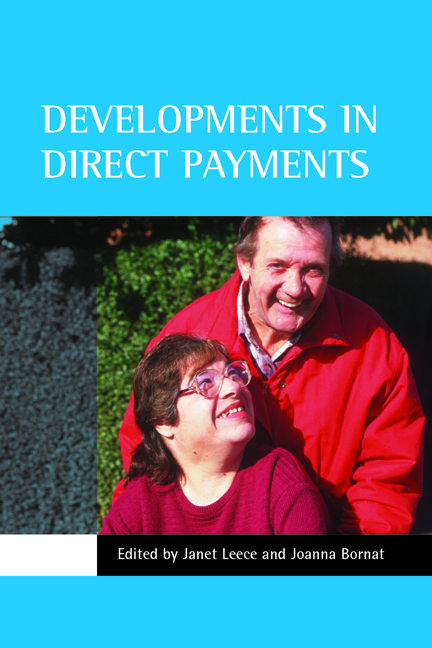Book contents
eight - Overcoming barriers to the take-up of direct payments by parents of disabled children
Published online by Cambridge University Press: 18 January 2022
Summary
The 2000 Carers and Disabled Children Act extended the power of local authorities to offer direct payments to people with parental responsibility for disabled children and disabled young people as an alternative means of providing a service. In October 2003 this power became a mandatory responsibility for local authorities, and this chapter explores the factors, which may be holding local authorities back from fully exploring the opportunities offered by direct payments, and the reasons take-up by parents has remained relatively low. The chapter will draw on two main sources of information, Direct payments:What are the barriers? (CSCI, 2004) and Direct experience: A guide for councils on the implementation of direct payments in children’s services (Carlin and Lenehan, 2004).
The implementation and take-up of direct payments for parents and disabled young people has varied considerably across the country and is extremely low in some areas. The figures collated by the Commission for Social Care Inspection (CSCI) at the end of September 2003 found that there were only 875 parents of disabled children receiving direct payments. Some areas such as Norfolk, Essex and Cheshire have relatively high numbers (between 50 and 100) of families receiving direct payments (source: personal communication), while in other areas direct payments had not yet been set up as an alternative means for providing services.
The CSCI report identified seven barriers to successful take-up of direct payments across all user groups. This chapter considers these barriers in the light of the work by the Council for Disabled Children (CDC) with 13 local authorities (see Carlin and Lenehan, 2004).
The CDC was keen to work with local authorities as direct payments developed and to highlight both the critical success factors and any significant barriers. Utilising a grant from the Department for Education and Skills, the CDC selected a group of 13 local authorities at differing stages of development and within different settings. The selection was made on the basis of local authorities having a particular interest in developing direct payments or because the CDC felt a local authority represented a particular political or community perspective. A group was formed and met six times over a period of 18 months, with additional written information provided.
- Type
- Chapter
- Information
- Developments in Direct Payments , pp. 111 - 122Publisher: Bristol University PressPrint publication year: 2006



